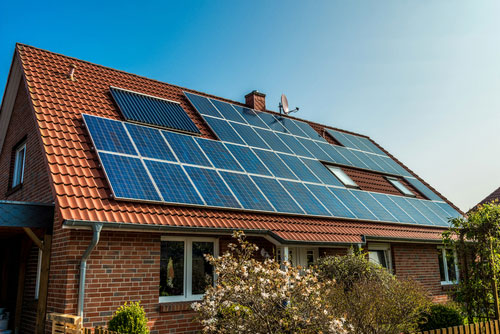How Solar Energy is Helping Developing Countries Achieve Energy Sustainability
As the world becomes increasingly aware of the need for renewable energy sources, solar energy is emerging as an essential component of many developing countries’ path to energy sustainability. Solar energy is proving to be a viable and cost-effective solution for countries facing energy and economic challenges.
The ability to generate clean energy from the sun is particularly beneficial in developing countries, where access to traditional electricity sources is often limited or unavailable. By installing solar panels, these countries can access a virtually limitless source of energy that is affordable and sustainable. This is an especially attractive option for rural populations that may not be connected to a power grid.
The implementation of solar energy in developing countries is already having a positive impact on health, education, and economic growth. The availability of renewable energy sources is helping to reduce air pollution levels, improving public health in the surrounding areas. Furthermore, solar energy is being used to power schools, hospitals, and other essential services, providing students and patients with access to reliable and consistent power. Finally, solar energy is also helping to fuel economic growth in developing countries by providing a more reliable form of energy, which can be used to increase productivity and bolster local economies.
The potential of solar energy in developing countries is immense, and its implementation is increasingly seen as a way for these countries to become more energy-independent. Solar energy has already made a significant impact in countries such as India, where the government has invested heavily in the development of solar infrastructure. It is clear that solar energy is playing an increasingly important role in helping developing countries achieve energy sustainability.
The Cost Benefits of Solar Energy for Developing Countries
The world is increasingly turning towards renewable energy sources as a way to reduce the environmental impact of electricity production. Solar energy, in particular, is becoming one of the most popular and cost-effective options for many countries, particularly those in the developing world.
With the cost of solar energy dropping significantly over the past decade, governments in developing countries are beginning to see the potential economic benefits of investing in this renewable source of energy. Solar energy is becoming increasingly cost-competitive when compared to other sources such as natural gas and coal, and it is also more reliable than other renewable sources such as wind and hydroelectric.
The cost benefits of solar energy are particularly attractive in developing countries due to the fact that they often have limited access to traditional sources of electricity. Solar energy is not only cheaper than traditional sources of energy, but it is also much easier to install and maintain, meaning that it can be set up quickly in rural and remote areas. In addition, solar energy is a clean source of energy that does not require the burning of fossil fuels, meaning that it does not contribute to air pollution or climate change.
When compared to traditional sources of energy, solar energy can also provide a more reliable source of electricity, which can be especially beneficial in developing countries where power outages are common. Solar energy systems are also easy to maintain and can last for decades, meaning that the upfront cost of installation can be offset over time.
Solar energy can also provide economic benefits to developing countries by creating jobs in the clean energy sector. As more countries invest in solar energy, the demand for skilled workers in the industry will increase, creating new economic opportunities for local populations. In addition, the use of solar energy will also reduce the amount of money that countries need to spend on importing energy from other countries, and will instead allow them to invest in their own energy infrastructure.
In conclusion, solar energy has the potential to offer significant cost benefits to developing countries, particularly when compared to traditional sources of energy. It is a reliable source of electricity that can be easily installed and maintained, and can provide a range of economic and environmental benefits. By investing in solar energy, governments in developing countries can create jobs, reduce their energy costs, and protect the environment.
The Role of Solar Energy in Improving Access to Electricity in Developing Countries
In recent years, solar energy has become increasingly recognized as a viable and cost-effective means of improving access to electricity in developing countries. Solar energy is an abundant and renewable resource that can be used to power homes, businesses, and other essential services in remote and low-income communities.
The demand for electricity in developing countries is growing rapidly due to population growth, urbanization, and industrialization. However, many of these countries lack the infrastructure and resources to meet this growing demand. This is where solar energy can be of great assistance.
Solar energy provides a reliable and cost-effective source of electricity. Unlike conventional sources of energy such as coal and gas, solar energy does not require the burning of fossil fuels. This means that solar energy is a clean source of power with no emissions or pollutants. This is especially important in developing countries, where air pollution is a major concern.
Solar energy is also relatively easy to install and maintain. Photovoltaic systems can be set up quickly and with minimal disruption to existing infrastructure. This makes it an ideal solution for remote communities that may not have access to the grid. In addition, solar energy is increasingly becoming more affordable, making it accessible to more people.
Solar energy can also be used to provide electricity to schools, hospitals, and other essential services in remote areas. This can help improve the quality of life for people living in these areas, as well as strengthen the local economy.
In conclusion, solar energy is an increasingly attractive solution for improving access to electricity in developing countries. It is a reliable and cost-effective source of power that can be used to power homes, businesses, and essential services in remote and low-income communities. It is also a clean source of energy with no emissions or pollutants, and it is becoming more affordable. Solar energy can help improve the quality of life for people living in these areas, as well as strengthen the local economy.
The Impact of Solar Energy on Poverty Reduction in Developing Countries
Over the past decade, the use of solar energy has become increasingly popular as a means of reducing poverty in developing countries. By providing an alternative, affordable source of energy, solar technology has become an invaluable tool in helping to alleviate poverty and improve quality of life.
In areas where access to electricity is limited or non-existent, solar energy has opened up new opportunities. By providing a reliable source of energy, it has allowed people to access basic amenities such as lighting, refrigeration, and communication. This, in turn, has enabled them to access education, healthcare, and better job opportunities.
Solar energy has also had a positive impact on the environment. By providing an alternative to traditional energy sources, it has reduced the dependence on fossil fuels, thus helping to reduce pollution and greenhouse gas emissions. In addition, solar energy can be used to power irrigation systems, which can improve agricultural productivity, leading to greater food security.
Furthermore, solar energy has the potential to create new economic opportunities. It can be used to power businesses, generate income, and create jobs. This, in turn, has the potential to generate revenue, which can be used to improve the living standards of the disadvantaged.
In conclusion, solar energy is playing an important role in reducing poverty in developing countries. By providing an alternative, affordable source of energy, it has allowed people to access basic amenities, reduce pollution, increase agricultural productivity, and create new economic opportunities. As such, it is an invaluable tool in helping to alleviate poverty and improve quality of life.
How Solar Energy is Enhancing Quality of Life in Developing Countries
In recent years, solar energy has shown immense potential to enhance quality of life in developing countries. The cost of solar energy is decreasing rapidly, and the technology and infrastructure to capitalize on these cost savings are becoming increasingly accessible. Solar energy is becoming a viable option for communities in developing countries that have traditionally lacked access to reliable electricity.
The impacts of solar energy on quality of life in developing countries are far reaching. For rural communities, access to reliable electricity is often the difference between a safe and comfortable home or one with unreliable, inefficient energy sources. Solar energy systems are becoming increasingly popular choices for these communities, as they are often more efficient and cost effective than other energy sources. In addition, solar energy provides a much cleaner alternative to traditional sources of energy, such as burning wood or coal. This drastically reduces air pollution, improving the health of local communities.
Solar energy is also becoming a popular choice for communities in developing countries that are looking to become more energy independent. Solar energy is an ideal source of energy for communities that are geographically isolated, as they can take advantage of the sun’s abundant energy without having to rely on a distant electricity grid. Solar energy systems also help reduce dependence on costly imported fuel sources, such as diesel or natural gas.
Finally, solar energy is helping to create jobs in developing countries. The installation and maintenance of solar energy systems requires specialized knowledge and skills, which creates new opportunities for workers in these countries. These jobs can also be highly lucrative, providing much needed economic opportunities for local communities.
Overall, solar energy is an increasingly popular choice for communities in developing countries looking to improve quality of life. This renewable energy source is becoming more efficient and affordable, and its potential to revolutionize energy access in these countries is undeniable.






